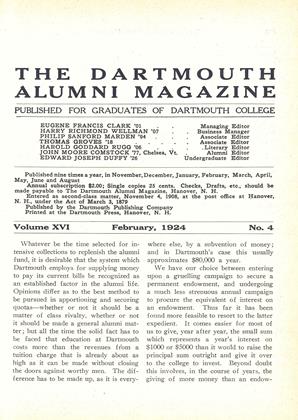E. W. Butterfield '97 is the of "Rural Depopulation in New Hampshire in The Granite Monthly for December.
Daniel Chase '14 is the author of an article "I Travel Up to Carcassonne" in Brentanos Bookchat for December, 1923.
Ellis O. Briggs '22 is the author of a story "The Witch of Erwan" in the January, 1923 issue of Smart Set. Mr. Briggs is also the author of an article "The Younger Generation's View" in McNaughts Monthly for January, 1924.
H. Thompson Rich '15 is one of four editors of a new poetry magazine published in Los Angeles entitled "Four." The first issue contains a poem by Mr, Rich entitled "To a Mocking Bird."
Hon. John W. Gordon '83 is the author of a poem issued in pamphlet form "To the Legislature of 1923, a Christmas greeting and souvenir by the gentlemen from Barre."
Charles E. Crane '06 is the author of a publicity pamphlet issued in behalf of the candidacy of Mr. Ernest W. Gibson to Congress from Vermont. This pamphlet has received a great deal of praise, and is said to have contributed largely to the election of Mr. Gibson.
The Boston Transcript for Dec. 12, 1923, contains an article by Clifford B. Orr 22 On Oliver Wallace ex-'2S. Mr. Wallace has recently opened a private press at Grand Rapids, Michigan. The first publication of this press, is "The Keeper of the Inn, a Story of the First Christmas" by Mr. Wallace. The book is illustrated and is a fine example of modern printing.
"The Origin of the War Term No Mans Land and Other War Expressions" has been issued in pamphlet form. This pamphlet deals largely with war experiences of J. Howard Randerson '12.
The Far Eastern Republic of Siberia. By Henry Kittredge Norton 1905. London: George Allen & Unwin, Ltd., 1923. 316 pp.
Many interesting and important things have been happening since the war in the great continent of Asia. T hey have been too much obscured by the engrossing perplexities of the European situation. Perhaps when the telescope of future history is trained back upon the past Asia will loom large, and Europe will shrink!
Now then a beam of light illumines the Asiatic shadows; and a vivid example is this book, which tells the fascinating story of the formation and growth of the Far Eastern Republic of Siberia. The author was on the ground at the time of many of the events which he relates, and writes with all the strength and freshness which come from first-hand information, and yet with praiseworthy restraint' and balance.
Siberia is still a small country in population (from two to three millions) but big in size, resources and latent power. The chief aim of the book is to tell the story of an experiment in government; and this is its real and permanent value.
Harassed by the so-called "Whites," most of whom, like the notorious Semonov, were nothing but unscrupulous bandits; bullied by the militaristic and land-grabbing regime then in the saddle in Japan; and cast adrift (probably fortunately) by Soviet Russia, which had plenty of troubles nearer home, a little group of resolute men, mostly Russian by birth, set about building up a national structure with the unpromising materials at hand.
And the leaders themselves were unpromising enough to our way of thinking. Read the chapter on "The Men at the Helm." Most of them were ex-exiles, and they were ex-nearly everything else; painters, tailors, farmers, druggists, teachers, journalists, one or two with a legal training. Some of them were wanted by the police of both America and Europe. All of them were "revolutionists;" most of them, but not all, were Communists in theory, but these theories were very considerably modified in practice, and the Government, while Socialist, is not Communist. If there is anything more dramatic or absorbing in fiction than the story of "Bill" Shatov, former I. W. W. lieutenant of Big Bill Haywood, follower of Emma Goldman, and how he became Minister of Transport in this Government, I have not seen it. To this stormy petrel, aged 33, was entrusted the problem of reconstructing and running the ruined Trans-Siberian Railway; and he solved it, coming out at the end with "a fair day's pay for a fair day's work" as his slogan!
I submit that there is much food for thought here for both our so-called "radicals" and "conservatives."
The book is well written, logically constructed (the author's legal training has served him in good stead) and carries conviction. It is well documented.
It is such a book as might have been written (but unfortunately was not) about the United States of America in 1790.
But read it for yourselves. It deserves it. I know of no higher praise than to say that I read it just after Ossendowski's "Beasts, Men and Gods," and in my judgment, Norton's book surpasses the other in every way. It is certainly one of the best things done by a Dartmouth man in recent years. James P. Richardson.
 View Full Issue
View Full Issue
More From This Issue
-
 Article
ArticleWhatever be the time selected
February 1924 -
 Article
ArticleDARTMOUTH IN THE SEVENTIES
February 1924 By Samuel L. Powers '74 -
 Article
ArticleDARTMOUTH JOTTINGS OF A SOMEWHAT DESULTORY READER
February 1924 By Fred Lewis Pattee '88 -
 Class Notes
Class Notes$1000 REWARD PEARL NECKLACE
February 1924 -
 Article
ArticleHARRY HARMON BLUNT
February 1924 By Thomas Dreier -
 Article
ArticleFROM THE UNDERGRADUATE CHAIR
February 1924
Books
-
 Books
BooksAlumni Articles
DECEMBER 1970 -
 Books
BooksJOHN SLOAN'S LAST SUMMER
October 1952 By Adelbert Ames Jr. -
 Books
BooksTHE ISLANDS
June 1936 By Allan Macdonald -
 Books
BooksCYCLES: The Science of Prediction
June 1947 By Bruce Knight -
 Books
BooksCRIMSON PHILIPPINE JUNGLE
January 1944 By Herbert F. West '22 -
 Books
BooksANY OLD WAY YOU CHOOSE IT: Rock and Other Pop Music, 1967-1973
March 1974 By J. MICHAEL STUART '71


